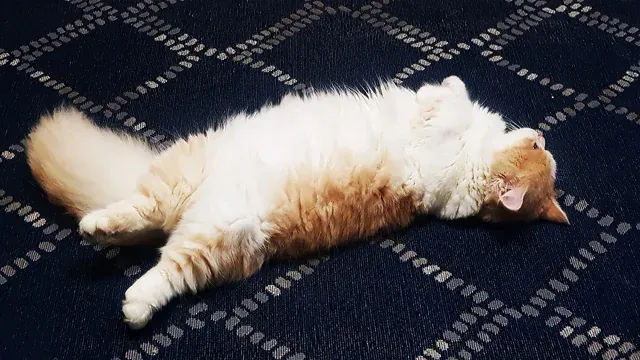Munchkin cat or Sausage cat is recognized by its very short legs caused by a natural genetic variation. This cat is considered to be the original breed of dwarf cat.
Munchkin cat breed has caused controversy in the cat world. This cat was discovered in America in 1983 where it was named after the ‘little people’.
Like Munchkin cat, the Shortlegged cat was reported in England in the 1930s and Russia in the 1950s but these breeds were not preserved. This breed is not recognized in the UK by the main UK cat fancy association.
Description
The Munchkin cat breed is a medium-sized cat with very short legs and a long spine. Munchkin cats have a thick body with a well-balanced chest.
This breed may have long or short hair. Both types have plush, all-weather coats with a silky appearance. The longhair Munchkin has a plumed tail. Munchkin cats can be in any color or coat pattern and their walnut-shaped eyes can also be any color.
- Coat Length: Short-haired type has a medium-plush coat while the long-haired has a semi-long silky coat.
- Size: Male weighing from 6 and 9 pounds as compared to females weighing from 4 and 8 pounds.
Personality
Curiosity and playfulness of this car continue well into adult age. Munchkin cats are sweet and outgoing. They are taught to play fetch and to obey voice commands. While Munchkin cats can leap on to countertops, many prefer to intelligently find an easier way up. Despite short legs, they can run very fast.
The short leg of this breed is a deformity that is linked to bone and spinal problems, so it has not been welcomed by all cat associations. Dog breeds with similar conformation are known to have problems with arthritis and it is feared that some will occur in the Munchkin cat breed.
Feeding & Grooming
Feeding: Every cat is unique and each has their particular likes, dislikes, and needs when it comes to food.
Cats are carnivores and every cat must obtain 41 different nutrients from their food. Proper nutrients will vary depending on age and overall health, so energetic kitten needs a different balance of nutrients in her diet than a less active senior cat.
Grooming: Munchkin cats may not have the flexibility to groom themselves on their own, as other cats do, so will need some assistance. This is especially true for those with those sporting long coats.
Characteristics of Munchkin Cats
Beyond their appearance, Munchkin cats possess characteristics that make them delightful companions.
- Health Considerations: Responsible breeding ensures the health of Munchkin cats. Regular veterinary check-ups are essential to monitor their well-being.
- Playful Nature: Munchkins maintain a playful demeanor throughout their lives, enjoying interactive toys and engaging in activities that showcase their agility.
- Adaptability: Despite their short legs, Munchkin cats adapt seamlessly to various environments, exploring with curiosity and zest.
- Sociable Disposition: These cats are social butterflies, forming strong bonds with their human companions and getting along well with other pets.
Caring for Your Munchkin Companion
Ensuring the happiness and well-being of your Munchkin cat involves specific care guidelines.
- Routine Veterinary Visits: Schedule regular check-ups with your veterinarian to monitor your Munchkin's overall health and address any concerns promptly.
- Enriching Playtime: Provide a variety of interactive toys to keep your Munchkin mentally stimulated. Their playful nature thrives on engaging activities.
- Safe Living Spaces: Due to their unique physique, create a safe environment for your Munchkin by eliminating potential hazards and providing cozy spots for exploration.
- Grooming Routine: While Munchkin cats have short fur, regular grooming ensures a sleek coat and minimizes shedding. Brushing a few times a week is usually sufficient.
FAQs of Munchkin Cats
Q: Can Munchkin cats jump despite their short legs?
A: Surprisingly, Munchkin cats are agile and can jump and climb with ease, showcasing their adaptability.
Q: Are Munchkin cats prone to health issues?
A: Responsible breeding minimizes health concerns. Regular veterinary check-ups help ensure the well-being of Munchkin cats.
Q: Are Munchkin cats suitable for families with children?
A: Yes, Munchkin cats' playful and sociable nature makes them great companions for families with children.
Q: Can Munchkin cats live in homes with other pets?
A: Yes, Munchkin cats are social and generally get along well with other pets, creating harmonious households.
Q: How long do Munchkin cats typically live?
A: With proper care, Munchkin cats can have a lifespan of 12 to 15 years or even longer.
Q: Do Munchkin cats require special grooming due to their short legs?
A: While their short legs don't necessitate special grooming, regular brushing is recommended to maintain their coat health.
Conclusion
Munchkin cats, with their endearing features and playful spirits, bring joy and warmth to any home. Whether you're a cat enthusiast or considering a feline friend for the first time, the charm of Munchkin cats is undeniable.
By providing love, care, and a playful environment, you'll be rewarded with the delightful companionship of a Munchkin cat—a small wonder with a big heart.


